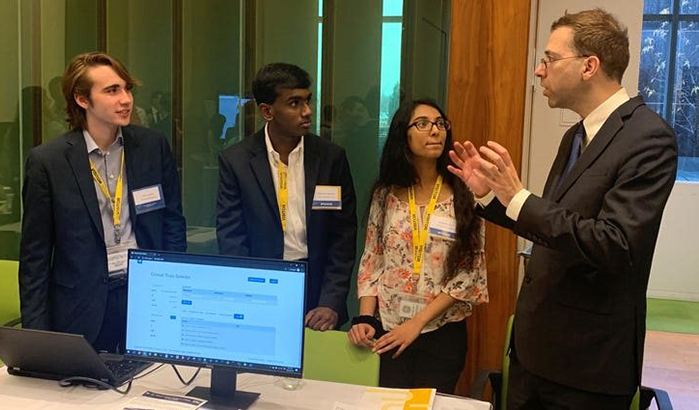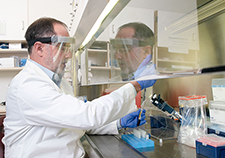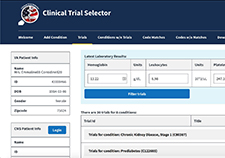Office of Research & Development |
 |
Office of Research & Development |
 |


The Girls Computing League tech sprint team discusses the Clinical Trials Selector app with Dr. Gil Alterovitz. From left to right: Ethan Ocasio, Neeyanth Kopparapu, Shreeja Kikkisetti, and Alterovitz. (Photo was taken prior to COVID-19 pandemic.)
November 4, 2020
By Erica Sprey
VA Research Communications
In the past, the term artificial intelligence, or AI, sounded like something that you would read about in a science fiction novel or watch on TV. Now, AI technologies are driving very real advances in disciplines like medicine and data analysis. To use the power of AI to benefit Veterans, VA created the National Artificial Intelligence Institute (NAII), in 2019. The new institute is tasked with bringing cutting-edge computer science to solve some of VA's most pressing challenges.
One way the NAII uses AI to improve Veterans' health care is through the AI Tech Sprints. As the name implies, the tech "sprint" quickly identifies and addresses an area of interest within VA— using AI-enabled technology and data—by bringing together groups from private industry and government over a period of months rather than years. The sprint allows for multiple perspectives that can lead to new prototypes that will advance solutions to benefit Veterans and others.
Throughout the tech sprint, teams have unique access to in-house experts, useful feedback from VA clinicians and staff, and novel datasets. At the end of each sprint, projects are recognized at a "Demo Day" event, in Washington, D.C., with awards for top performers and potential opportunities for ongoing collaboration with VA.
"We worked to make information available, so that tech sprint participants would be able to leverage that data quickly."
Dr. Gil Alterovitz, director of artificial intelligence, leads the NAII. He has been an integral part of the AI Tech Sprints—driving industry collaboration and mentoring new innovators. "Given how health care is evolving," Alterovitz told VA Research Currents, "AI is really the only way to move forward in terms of reducing costs and providing better care. AI is key to really taking advantage of data to help Veterans and potentially others, as well."
The 2020 tech sprint is currently open to new teams. Interested teams should complete the short application on the NAII website. For more information on the sprint process, a handbook has been released that enables offices across VA and other agencies to replicate the voluntary incentivization framework.
Theme: Interventions for Veterans not currently served by VA
Open to applications: Nov. 1, 2020
Information session: Nov. 23, 2020
Applications due: Dec. 26, 2020
AI Tech Sprint competition: Jan. 4, 2021 through April 7, 2021
Each year, the tech sprint is focused around a theme, although participants are not limited to work in that area. The 2020 AI Tech Sprint, which opened Nov. 1, focuses on interventions for Veterans not currently served by VA. There are currently 17.4 million Veterans who live in the U.S., but only 9 million of those Veterans are enrolled in VA's health care system. Through the tech sprint, VA aims to reach out and engage these Veterans to help promote their well-being, enhance their health care, and monitor chronic health conditions.

AI to Maximize Treatment for Veterans with Head and Neck Cancer

VA Further Develops Its Central Biorepository: VA SHIELD

VA Launches Scott Hannon Initiative for Precision Mental Health
Teams participating in the 2020 tech sprint will have access to a dataset of synthetic patient files called SynVA. VA researchers generated SynVA by establishing over 200 patient archetypes representing 11 million patients recorded by the VA electronic health record. From there, 1 million synthetic patient records, representative of the VA, were generated.
The synthetic patients may exhibit the top 1,000 clinical conditions documented globally (using SNOMED codes), and have full associated records including visits, procedures, measurements such as lab values, and drug exposures. By simulating VA-representative patients, the synthetic data facilitates sharing this data during the tech sprint while protecting the privacy of actual patients.
Last year's tech sprint, that concluded December 2019, centered on new application programming interfaces to make VA data accessible. An application programming interface, or API, is a software tool that allows two different applications to talk to one another. For instance, when you use an online travel service like Expedia to book an airline flight, your computer is using an API to access information from multiple airlines to find that perfect flight. APIs are pervasive in the tech world—they are working quietly behind the scenes to support websites like social media, search, or the National Weather Service.
"Around the time of the 2019 AI Tech Sprint, there was an event at the White House focused on new types of application programming interfaces to access new types of information," says Alterovitz. "We worked to make that information available, as well as experts and data across the VA central office and research field sites, so that tech sprint participants would be able to leverage that data quickly."
During the 2019 sprint, each team developed a new computer application or app that could benefit the health of Veterans and others. Notably, the mix of innovators ranged from a group of high school students to large tech companies like Oracle Healthcare and Sanford Imagenetics. At the conclusion of the sprint, six teams were invited to demonstrate their technology at The Opportunity Project (TOP) Demo Day, held at the U.S. Census Bureau in Washington, D.C., in late 2019.
Two of the six teams from the tech sprint were singled out for further recognition during Demo Day. Composite Apps was named winner in the "Creating the Future of Health" category, and received $20,000 for its app, CURA Patient. The Girls Computing League won honorable mention for its Clinical Trials Selector App.
In 2019, the theme for the AI Tech Sprint was clinical trials search. That could mean patients searching for clinical trials or doctors who wished to refer patients to trials, according to Alterovitz.
A team affiliated with the Girls Computing League developed the Clinical Trials Selector (CTS) app to help Veterans more easily find clinical trials related to their health conditions. The team of high school students included Neeyanth Kopparapu, Ethan Ocasio, and Shreeja Kikkisetti. Nikhil Pesaladinne joined the team in 2020.
The Girls Computing League (GCL) is a Virginia-based nonprofit dedicated to helping students from underrepresented and minority groups gain access to computer science education. It was founded by Kavya Kopparapu and her brother Neeyanth.
During the tech sprint, the team had the opportunity to talk directly with Veterans, subject matter experts, and VA representatives about Veteran-specific needs. That is one of the strengths of the AI Tech Sprint—bringing together end-users and innovative changemakers. The team was also introduced to two open-source APIs that could be used to build an app to benefit Veterans searching for clinical trials.
"The project we were working on had the potential to make a real impact on the world—it was not just a school project," says Ocasio. "We got the idea for the CTS because the VA Health API and the CMS Blue Button API were resources that were new to us. We wanted to use resources that we had to make something new and impactful."

The web-based Clinical Trials Selector app is live and in alpha testing. Veterans and Medicare beneficiaries can use the app to find research studies related to their medical conditions.
There are 9 million Veterans enrolled in the VA health care system and more than 50 million Medicare members. That means a vast amount of clinical data resides in VA health records and Medicare claims data.
A 2019 AI Tech Sprint team—composed of three members from the Girls Computing League—envisioned building an application that could pick out relevant information from a Veteran's medical record, that could then be used to determine whether a person would qualify for a particular clinical trial. The challenge, however, was extracting that data in an efficient manner.
The GCL team decided to use the VA Health API and natural language processing (NLP) to extract data from a Veteran's electronic health records. In this case, NLP uses artificial intelligence to pull data from unstructured physician notes in the health record. Think of it as translating a written patient assessment into multiple ICD-10 billing codes that an application would then recognize. For instance, C61 is the ICD-10 code for a diagnosis of a malignant neoplasm (cancer) of the prostate.
The CTS app is now live and in alpha testing. Interested Veterans who receive care through VA or Medicare beneficiaries are able to log into their My HealtheVet or Centers for Medicare and Medicaid Services (CMS) accounts using the app to receive a list of potential clinical trials, according to team member, Ethan Ocasio. Prior to going live, CTS was evaluated by VA's API team to ensure that it met rigorous security standards.
The GCL team is also looking to expand data sources for the CTS. In addition to VA's VistA electronic health record, Medicare claims data, and the National Cancer Institute's clinical trials database, the GCL has now included information from ClinicalTrials.gov.
Since the tech sprint, the GCL team has been busy writing whitepapers and grant proposals to help fund web hosting services for their app. GCL received $20,000 in resources from Amazon, which will enable them to continue development and testing for the CTS app. Ultimately, notes Ocasio, the goal is to find a permanent home on an organization's website for their application.
"As the use of the application continues to increase, it will require more cloud computing resources, beyond what GCL as a nonprofit student group can support long-term. The GCL team is in negotiations about finding a future home for scaling CTS."
VA Research Currents archives || Sign up for VA Research updates